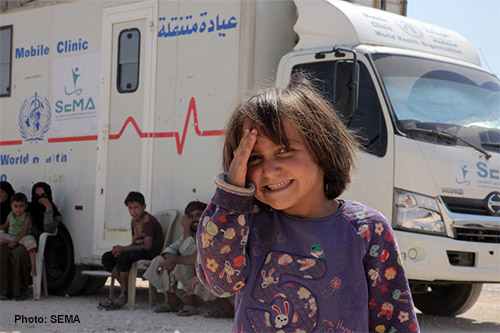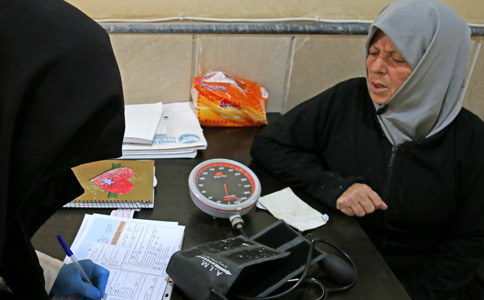To enhance the coverage of affordable basic PHC services, WHO donated over 2.1 million treatment courses of life-saving medicines (including NCD kits) to health partners and delivered 406 pieces of equipment such as nebulizers, laboratory and ultrasound equipment, pulse oximeters, X-ray machines and generators to ministries, the Syrian Arab Red Crescent and NGOs. The Organization also supported over 5.2 million consultations in PHC centres throughout Syria.
Among the PHC efforts most appreciated by beneficiaries during 2019 was WHO’s donation of 27 mobile clinics to health responders across the country. WHO also provided 12 medical caravans to health partners working in the major IDP camps and informal settlements in the northeast. Each set of two caravans consisted of three clinics and a pharmacy.
Among the mobile medical teams supported by WHO were four teams in Homs and Hama that were providing services for people from Rukban settlement and two teams deployed to schools in eastern Ghouta as part of an oral health project.


WHO integrated NCD treatment services into nine PHC facilities in northwest Syria. More than 23 000 patients were screened for cardiovascular diseases and more than 15 000 NCD consultations were provided. In 2020, WHO intends to replicate the model in other centres in the northwest. WHO also piloted an NCD emergency kit in 12 PHC centres in northwest Syria and trained almost 200 health workers on risk factors for chronic diseases and managing patients with thalassaemia. In line with restoring PHC services, WHO supported centres in Aleppo and Homs with essential medical equipment. During the year, these centres provided health care services to nearly 100 000 people, including physiotherapy for amputees as well as services for patients with artificial limbs and movement disorders. The core package of services at each health centre was reviewed and updated on a quarterly basis. These services covered general clinical services, child health, immunization, nutrition, NCDs, communicable diseases, sexual and reproductive health, mental health and essential trauma care.
In northeast Syria, WHO supported PHC centres and mobile clinics in all three governorates.








